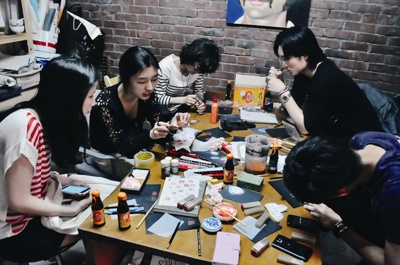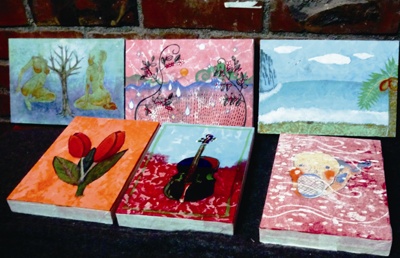
A small group of amateur artists aged from 20 to 50 concentrates on their own art work, stroking brushes and grinding muk (black ink used for Korean paintings) in a small art studio. There, people can learn about Korean paintings and change their stereotypical concept of the genre, which is often seen as being stiff, hard, and difficult to approach. In order to change the public perception of Korean painting and make it easier for people of all ages to approach, three university students started a Korean traditional art class called “Hwa Won.”
The three managers of Hwa Won include seniors at Hongik University, each of who majors in Oriental Painting. Park Ji-eun, Oh Bo-reum, and Lee Ye-in use the nicknames as Jjin-Jjin, Oh-bbo, and Coli, respectively, and call themselves the Yazakuno Family – a name that comes from the word yajak, which means working-all-night in Korean.
The name of the class they offer comes from the word hwawon, which is derived from the artists at the Dohwaseo, the official art academy during the Chosun Dynasty.
The Hwa Won leaders first started the idea of the class when they participated for entering contests sponsored by the “Green Light Cafe,” where artists can exhibit and sell their works. Majoring in Oriental Painting, the members all had similar hopes for making Korean painting more popular to non-art majors, many of who only have vague understandings of Korean paintings. They wanted to enlighten people about the diversity that exists in Korean paintings.
“Most people think of Korean painting as monotonous since Korean paintings only uses muk, which is thought to be plain black ink,” said Park Ji-eun (Hongik University, 4), one of the managers of Hwa Won. “However, the black colors used in Korean painting are not all the same. Like night-skies changing colors minute after minute, black colors in Korean paintings feature various colors through shading and using exotic materials.”
Classes start at 7:00 p.m. on Tuesdays and at noon on Saturdays. The two-hour-long classes include different projects each week, using various materials and skills. The curriculum for the classes that has a span of six months is planned in advance, but they also hold surprise performances outdoors and demonstrations on Korean paintings.
At the end of June, Hwa Won plans to hold a small exhibition that will include art works made by the participants of their classes. Since each class topic is independent, anyone can apply for individual classes. Paying participation fee is voluntary, although it requires at least 5,000 won each week.

“One of the most regretful things while planning classes is that we need to limit the numbers of each class to 10 due to the small place,” Park said. “Our motto is ‘to everyone, everyday, easy to approach.’ However, due to the limitation of space, we need restrictions not only in the class size but also in materials used in classes.”
Other than the restricted physical space, the members of Hwa Won think their goal cannot be reached since their classes are short-term, lasting only a week; rather they want to create a place where people can truly experience Korean painting.
Hwa Won’s members say they have learned priceless lessons through organizing, preparing classes, and teaching participants.
“I am always surprised at the imagination and originality of the participants,” Oh Bo-reum (Hongik University, 4) said. “People who have never drawn a Korean traditional painting before have different ideas and special approaches of their own and I love seeing those works.”
Song Ru-hee, a participant in the workshop, says she found out about the program in February.
“I am a mother, but I try to participate every week since it is fascinating to learn new skills like adding traditional mixtures and materials in my own art work,” Song said. “Korean painting is much easier than people think. I enjoy this very much and hope that this workshop lasts.”
According to Park, Hwa Won values its experience as a precious moment to meet various people from other fields.
“I am joyful to see participants concentrating on their work and showing deep interest in Korean tradition,” Park said.

